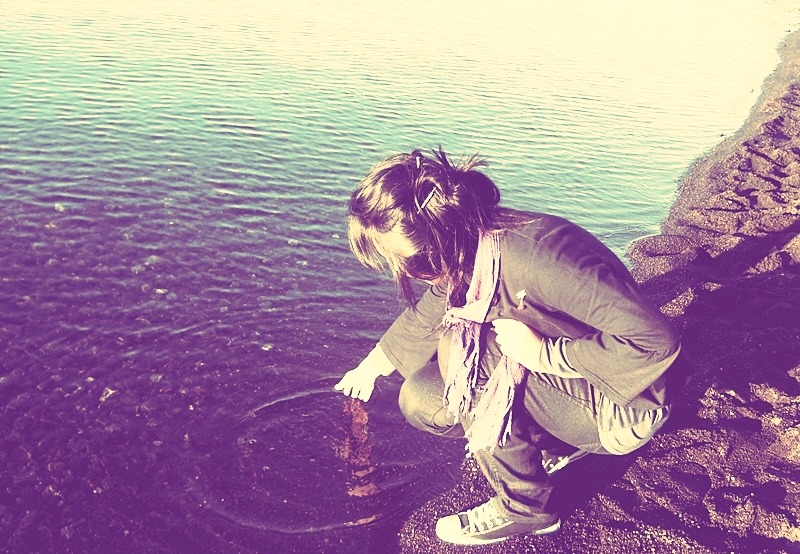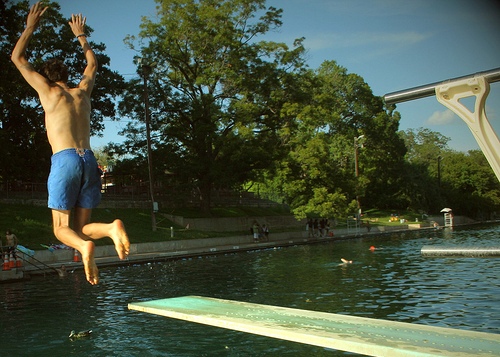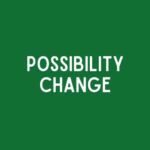I sat in my car next to the tennis courts watching other people arrive. My hands shook and my stomach churned. I told myself I would get out of my car and walk onto the courts the second the clock on the dashboard switched to 8:30.
I had just joined a meetup group and was at the park that morning to play tennis for the first time in years with people I had never met.
And I was terrified.
It seems silly to be afraid of such a little thing like meeting people to play a game. But it’s indicative of the fear I’ve lived with for much of my life—fear of making a mistake or a poor decision, fear of looking silly, of being rejected, of not being perfect.
I have often let the fearful part of me have a dominant voice. As a result I stayed small. I didn’t let many people into my community. I didn’t try new things. I didn’t do the things that really excite me. I didn’t grow.
I thought I was just a fearful person who was not made to do brave and exciting things. Now I’m learning to change the way I experience fear and opening the door to a more joyful, fulfilling life.
1. My fear is a part of me.
Fear isn’t an outside force invading my mind to make me miserable. Because my fear is a part of me I can never really get rid of it. Trying to shut it out or shut it up won’t make it go away. If I don’t allow it to express itself, my fear will continue to try to get my attention by any means it can. Sometimes fear is like a small child trying to tell me something she believes is very important. If she thinks I’m not listening, she’s going to get louder and more obnoxious to get my attention. It’s important to listen to what my fear is trying to tell me—both to determine whether the concern is valid and to be respectful of all parts of myself. Stuffing down my fear is stifling a piece of myself.
2. My fear has a purpose.
Fear does not exist to be mean or keep me from doing the things I want to do. My fear is actually trying to protect me. It just doesn’t always go about it in a pleasant way. My fear really kicks in when it senses a threat to my well-being, whether the threat comes in the form of physical danger, potential rejection, or possible failure. Sometimes my fear is valid and can help me avoid a harmful situation. Other times my fear might just be uncomfortable because I’m expanding outside my comfort zone. The only way I can know for sure is to listen to what my fear is saying.
3. I can decide how my fear talks to me.
It can be hard to listen to my fear. My fear believes it has a very important message to tell me and will do whatever it takes to be heard. But I don’t have to listen to abuse or obnoxious behavior. I can tell my fear that I want to know what it has to say, but it’s really hard to listen when it is unkind. I can ask it to rephrase and tell me its concerns in a way that doesn’t make me feel bad. I often do this by writing out a dialogue between myself and my fear in my journal. Find a way to set boundaries for your fear that works for you.
4. My fear isn’t a reason to not do something.
Sometimes my fear has a very valid point and helps me avoid something harmful. Often, however, my fear is triggered by anything that stretches my comfort zone. While moving outside my comfort zone is…well…uncomfortable, it is also necessary to grow. If I limit my actions and interactions to only things that are comfortable, my life experience will be very narrow. If my fear is trying to hold me back because I might look silly or make a mistake, it might be the best and most enjoyable thing for me to do whatever I’m afraid of anyway.
Everyone is a beginner sometimes and nobody is perfect. These things are just a very normal part of being human. The only way to move past being a beginner is to let ourselves begin. If we let our fear prevent us from ever stepping outside our comfort zone and trying something new, we miss out on so much. If I wait until I stop feeling afraid to try something, I’ll likely never try. The only way to stop being afraid to do something is to do it. In fact the more often I try new things, the more I can afford to make mistakes because I know I’ll have another opportunity to try again.
5. The presence of fear doesn’t mean the absence of other feelings.
It’s natural to feel afraid when we try something that stretches us, but new experiences can also prompt excitement and joy. They aren’t mutually exclusive. We can feel excitement and joy right alongside our fear. When we are willing to acknowledge and accept that we’re afraid, but choose to focus on the parts that are exciting and fun we’re more likely to have a positive experience in spite of our fears.
6. Fear sometimes shows us what we care about most.
It’s easy to think of our fear as a warning against things that might harm us. But sometimes fear actually points to what we really desire. We are afraid to test the things that are important to us because as long as we don’t test them they are still a possibility. But when we don’t try those things we care about most they remain only a possibility, never a reality. The longer we put off following through on our dreams, the higher the pressure to get everything just right becomes and the more afraid we are to ever try. If something doesn’t really matter to us we’re less afraid to try because it doesn’t matter if we fail.
Fear will always be a part of my life. It’s a valuable part of me. But when I know how to interact with my fear in a healthy way it doesn’t keep me limited and hidden. Instead I can lean into the discomfort of trying things that will help me grow and take steps toward building a life that truly excites me, all the while knowing there is a part of me watching out for my well-being.
When I got out of my car to join the tennis group even though I was afraid I showed myself I don’t have to banish my fear, but I don’t have to be limited by it either. I did not play as well as I would have liked, but started improving the longer I played. People were kind and patient. I had fun and the fresh air and exercise energized me for the rest of the day. I still had to talk myself out of my car the next week, but each time gets a little easier.
What is your relationship with your fear? Do you ever feel like you’re in a constant battle to dominate or be dominated? What is something your fear is trying to tell you today? How are you going to respond?
Photo by Camdiluv






Your article on fear resonated with me. It was like you were inside my head, along side me constant companion:fear.
Thank you for outlining the 6 ways to embrace fear and use it rather than let it paralyze you. I will keep this article handy and refer to it often
I’m so glad this resonated with you, Pearl. I hope these ideas can be helpful to you in cultivating your relationship with your fear. Fear may be our constant companion, but it doesn’t have to be an unwelcome one. Thanks for sharing.
i totally agree with you
Thanks, scarletskye!
This article to simple yet so very powerful. As I read, it was as if I was looking at my inner self.
I understand so well those feelings of fear that can paralyze and destroy creativity and growth; for me it is a constant struggle.
Thank you so much for sharing and helping me to see fear as a friend that can push me forward, and not an evil enemy.
Yes, Patrice! We don’t have to let fear paralyze us, but can actually use it to help us grow. I hope these ideas are helpful in seeing your fear as less of an enemy and more of a friend. Thanks for sharing.
Thank you for sharing this, I like your perspective of fear. I constantly feel I am battling fear. It is at times exhausting, but I keep trying.
Thank you so much, Jamie. Yes, battling fear can be so exhausting. I hope some of these ideas can help you develop your relationship with your fear.
Johanna,
I love how well you know yourself and how you are allowing the big discomfort of fear to co-exist with doing what you want to do. I imagine your words and story can be a big inspiration to others who haven’t yet found that fear is a part of a life well lived.:)
Vanessa, thank you for your kind words. Getting to know ourselves is such a rich, worthwhile process. I’d love to help others along their own journeys.
This is a wonderful post. I, too, have been looking at my relationship with fear, and why there are new moments now, as I am in my 60’s, when previously fearful events simply never evolve into fear. I’m not saying it happens all the time, but for some reason there is a calm that comes over me that is quite new to my nature. And I of course love it and am working on capturing it.
So thank you again. More fodder for my musings.
Barbara, thank you for sharing. It’s wonderful to see how your own relationship with fear is growing and changing. I’m so glad you enjoyed the post.
Johanna, I love this post.
It’s true — fear isn’t a reason to not do something. Fear is simply an emotional response, it’s only ever a limitation if we want it to be.
Thanks!
Thank you so much, Jake. Our emotional responses can teach us so much if we’re willing to sit with them and pay attention to what is really behind them.
This is exactly what I’ve been struggling with, thank you for sharing.
Amelia, I’m so glad if this is helpful. Thanks for commenting.
Hi Johanna!
I’ve never been able to word my feelings nearly half as eloquently as you have right here – this perfectly sums up my thoughts towards a lot of opportunities and experiences.
I’ve come a long way in the last two years but there has been one quote that has stuck with me since my first public speaking seminar after graduating that I’d like to share.
“If it’s something that scares you, it’s probably something you need to do.”
My boss sprung it on me as we were heading to the auditorium. Since then I’ve felt the doubt in myself subside. No longer is everything a test of my knowledge, but an opportunity to grow and embrace a new experience.
Thank you so much for sharing and best wishes!
Thanks so much for sharing about your own journey with fear, Katelynn. I think there are some things I’m afraid of that I just don’t want to do or aren’t in my best interest, but so often our fear does point us to opportunities for growth. Seeing those things we’re afraid of as a chance to embrace a new experience instead of another way we don’t measure up brings so much freedom. Best wishes!
I love how you have turned around and faced your fear head on. You have embraced it’s presence and come into a sort of understanding with it. I never thought to look at fear this way. Thanks for sharing.
-Tara
http://absolutelytara.com
Thanks, Tara! I’m so glad I could help you look at fear in a different way. It’s a new perspective for me too, but it’s making such a diffence in my life.
Thank you for this article! I always read The Change Blog but have not been compelled to make a comment until now. I really needed this article. I am dealing with this right now as I am working on trying to actually have a social life. It is very hard to say yes to plans and to talk to people, but I have an event this weekend I agreed to and am afraid so this helped me.
Thanks again
Ann, I’m so glad this is helpful for you. I totally hear you that social activities and talking to people can be really hard. Thank you for commenting and best wishes for your event this weekend!
oh my gosh, Johanna! your story is so familiar to me, it’s like a page out of my own book! I can’t count how many times I’ve sat in the car waiting for the clock to change to EXACTLY the scheduled time so I could force myself to do something I’m terrified of doing.
Your recommendations are spot-on. I love the idea of looking at fear with more acceptance and understanding instead of trying to push it away (and likely beating yourself up in the process). Thanks so much for sharing your experience!
Thanks so much for sharing, Stephanie. It’s always so encouraging that I’m not the only one.
Thank you for this Johanna. What a great post. I really appreciate how you’ve talked about just accepting our fear and acknowledging it for what it is, but not letting it be used as an excuse to prevent us from living our lives in rich and deep ways.
Thanks again,
Julia Kristina
http://juliakristina.com/blog
Thanks, Julia Kristina! I really appreciate your kind words.
Wonderful article, Johanna. I so much agree that fear is actually here to protect us even though that doesn’t mean we shouldn’t follow what triggered the fear in the first place. Therefore, it is vital to learn to dance with the fear and thus, be the guiding force, instead of combating it.
Thanks again!
Yes, Yes! We can learn to dance with our fear. We can lead without combat. Thanks, Martina!
“When I know how to interact with my fear in a healthy way it doesn’t keep me limited and hidden”…brilliant! I totally agree!
I see fear as a guidepost along our journey. It dictates the speed but not the journey itself.
I also love how you recognized the need to listen to our fear. I believe fear has a voice. However, it hasn’t developed it’s communication skills.
Refreshing take on fear. Thank you for sharing. :)
Thanks so much, Christine! I really appreciate you sharing your thoughts.
I really resonated with number 2 (My fear has a purpose).
This is so true. Our fear is trying to help us by doing what it does best. It becomes far less debilitating when I’m able to see it as—not an enemy—but a compassionate friend.
I’m so glad this resonated with you, Andreas. It’s so easy to see fear as our enemy. When we realize our fear is actually trying to protect us, we can stop fighting it and start learning from it. Thanks for sharing!
Just wanted to say what a wonderful article this is, I couldn’t stop thinking about it after I read it.
It’s funny how much power fear can have over us, how self-contradictory it can seem, and how many types of fear there are, all of which feel more or less the same. As with most uncomfortable emotions, we have to tendency to try to overpower it or chase it away, but it only comes back stronger each time. In the end we really must learn to live with fear and allow it to serve its purpose without handing it the reigns. This takes a level of familiarity with fear that I think most of us would be happier to avoid, and for that reason not many people talk about fear as a part of us that will last our entire lifetime. It’s the truth, though, and we may as well keep our Guest House open to that constant visitor, as well as finding a way to exist harmoniously with it when it comes around.
Thank you for having the courage to write so openly about fear.
I’m so glad this resonated with you, Sky. Thanks so much for sharing your thoughts. I particularly like what you said about letting fear serve its purpose without handing it the reigns.
I really enjoyed your point about fear not having to be a reason I don’t do something. It can be a signal to proceed after preparation but not a dead end.
Yes! Fear can be a signal that we need more preparation, but it definitely doesn’t mean we can’t proceed. Thanks so much for the comment, Tony!
Hi Johanna,
I enjoyed reading your article a lot. I love that you pointed out the fact that fear is healthy at times. The kind of fear we experience most of the times isn’t, however. I recently wrote an article on fear, http://everydaypowerblog.com/2015/03/26/that-four-letter-word-f-fear/. Please check it out. I love reading from like-minded people such as yourself and everyone in this community. Keep sharing your stories.
Thanks so much for your comment, Yvonne. I really appreciate you sharing your own article on fear! It’s so important to develop healthy ways to interact with our fear.
Thank you so much for sharing. For a long time I’ve been trying to deny and ignore my fears in hopes that they would go away, but I appreciate your insight on learning to accept, understand, and dominate my fear. There have been countless times where I have passed up on opportunities because I was too afraid to try, only to regret it later. I am excited to try having a journal of dialogue between my fear and myself. I think it’ll help me acknowledge my fears and sort through them. Once again, thank you!
Thanks for sharing, Yee Lo! I’m so glad you found this helpful. It’s really discouraging to realize we missed out on an opportunity to try something we wanted to do out of fear. I hope having a dialogue with your fear in your journal can help you better understand and interact with your fear. I’d love to hear how it goes!
Really great article Johanna, thanks for being so open and sharing your story!
Thanks, Luke! I really appreciate the encouragement.